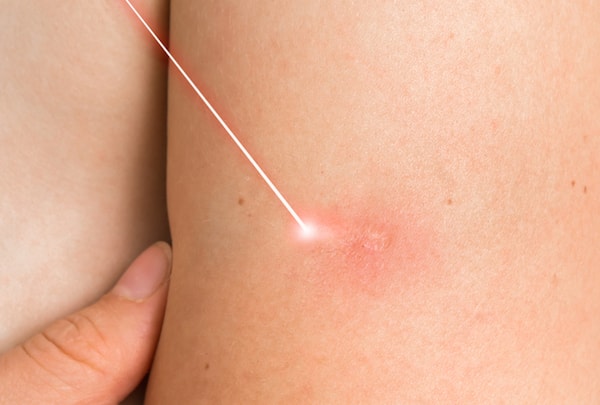Scars that are visible on the body can cause a person to be ashamed of their appearance and try and hide them from the view of others. In addition, these scars can cause pain and itching on the part of the patient. In order to reduce the size and appearance of a scar, patients often turn to laser treatments to address the look of the scar, Laser treatments for scars stimulate the growth of new and healthy skin while also making the scar less noticeable and not as uncomfortable for patients. Laser therapy for scars can be used on acne scars, surgical scars and scars that are the result of an injury.
Laser Treatment for Scars Explained
Laser treatment for scars penetrates the outer layers of the skin in order to stimulate the growth of new and healthy skin. The laser works to remove skin that is older and damaged so the new skin can take its place.
A scar is a natural response that the body creates when there is an injury. While they do not normally require any type of treatment, scars can be painful and also impact the self-image of a person. In addition, a scar might limit the range of motion of the skin around the scar so reducing the scar helps the area located around it.
Doctors have a number of lasers they can choose from to reduce the appearance of a scar. These laser choices have different light wavelengths. Some of the lasers are ablative which means they remove the top layer of the skin while others are non-ablative which means they go underneath the surface of the skin to make the desired changes.
Some of the most popular laser choices include:
- IPL (Intense Pulsed Light)
- Ablative Fractional Carbon Dioxide Laser
- Non-ablative Fractional Laser
Before making the final decision about which type of laser to use to treats scars, the doctor will need to perform a thorough examination of the scar to determine the amount of changes and improvements that can be made to the scar.

Types of Scars that can be treated with Lasers
There are many types of common scars that can be treated using lasers including scars from an injury as well as acne scars and scars that limit the range of motion of the area around the scar. In addition, scars that are the result of a burn or scars that appeared as the result of a previous surgery can also be treated using lasers.
There are times when laser therapy is not enough to treat a scar and provide the desired final appearance. In these cases, doctors might use injectable filers to plump up the skin around the scar which can make the actual scar less noticeable.
Laser Treatments for Scars Procedure
Although different types of lasers can be used by doctors to treat scars on the skin of a patient, the laser treatment for scars procedure is often the same for patients:
- The doctor will clean the area located around the scar
- The doctor might use a numbing cream or local anesthetic to lessen any pain or discomfort
- The doctor places gauze or wet towels around the area with the scar to absorb any laser pulses that might impact the otherwise healthy skin
- The doctor moves the laser over the scar tissue with the occasional use of a cooling saline on the skin
- Once the laser treatment is finished, the doctor applies ointment to the treated area and places a dressing on it to protect the treated area
The area that is treated by the laser might be red for several hours after the treatment. There could be some mild swelling and a stinging sensation that is similar to sunburn.
Laser Treatment for Scars Risks
Some of the most common risks of laser treatment for scars include:
- Bleeding
- Swelling
- Infection
- Skin Discoloration
Laser Treatment for Scars Cost
Patients will need to pay for their laser treatment for scars if the procedure is being performed for cosmetic reasons. If the treatment is being performed because of any health reasons, insurance might pay for some of the treatment.
In general, the cost for laser treatment for scars is in the range of $2000-$2500 for an ablative laser treatment and $1100-$1300 for non-ablative laser treatment.
Laser Treatment for Scars Consultation
Patients interested in undergoing laser treatment for scars should schedule a consultation appointment to have their scars examined by a doctor. The doctor will be able to tell the patient the best type of laser to use to achieve the desired results as well as set realistic expectations for the changes that can be achieved using the laser treatment. Once the laser treatment for scars is performed, the patient will enjoy a reduced appearance to the scars while also having new and healthy skin growing to provide the person with skin that is rejuvenated and refreshed in its appearance.
